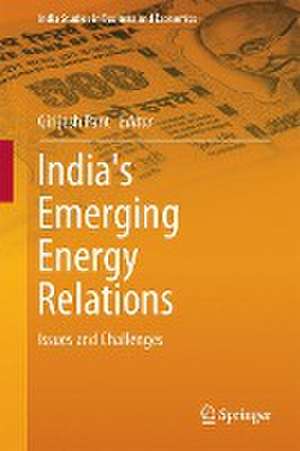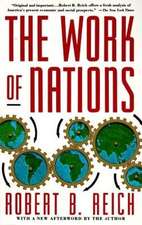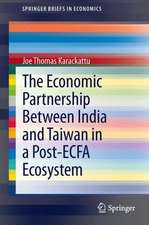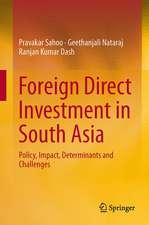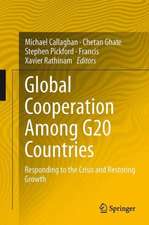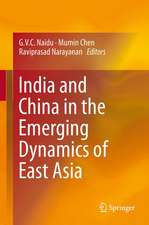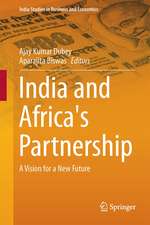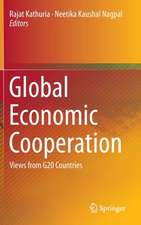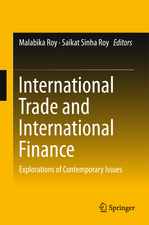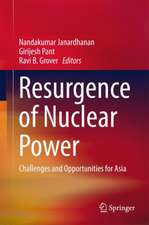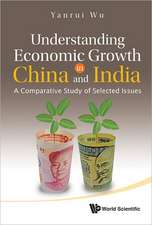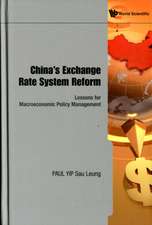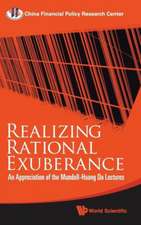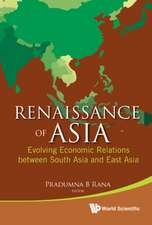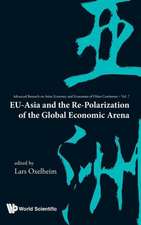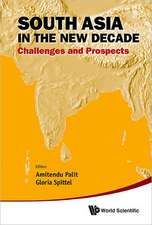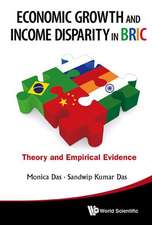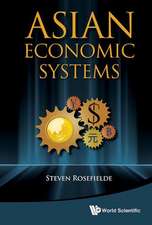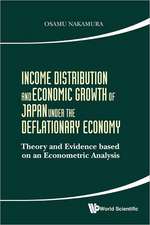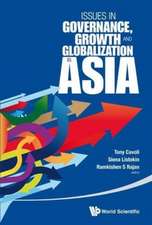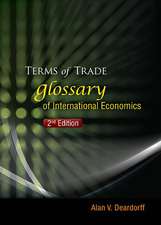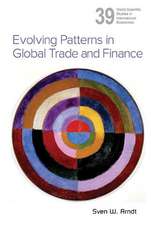India's Emerging Energy Relations: Issues and Challenges: India Studies in Business and Economics
Editat de Girijesh Panten Limba Engleză Hardback – 23 oct 2015
Today, the global energy regime is undergoing fundamental changes, as is the power dynamics of the global energy order. There are now many new producers and diverse consumers. The trade in energy has increased in volume and its direction has shifted from the West to the East, and the ongoing structural changes in the energy market call for a new security architecture. Given the complex and competitive environment of the new geo-economics and geopolitics of energy, the question could well be, should India frame energy issues in conflict mode or move toward innovative cooperation? In either case the message is that India needs an integrated energy security policy.
| Toate formatele și edițiile | Preț | Express |
|---|---|---|
| Paperback (1) | 382.57 lei 6-8 săpt. | |
| Springer India – 23 aug 2016 | 382.57 lei 6-8 săpt. | |
| Hardback (1) | 389.88 lei 6-8 săpt. | |
| Springer India – 23 oct 2015 | 389.88 lei 6-8 săpt. |
Din seria India Studies in Business and Economics
- 18%
 Preț: 897.65 lei
Preț: 897.65 lei -
 Preț: 361.77 lei
Preț: 361.77 lei - 18%
 Preț: 1006.24 lei
Preț: 1006.24 lei - 18%
 Preț: 952.89 lei
Preț: 952.89 lei - 20%
 Preț: 883.20 lei
Preț: 883.20 lei -
 Preț: 186.41 lei
Preț: 186.41 lei - 15%
 Preț: 636.94 lei
Preț: 636.94 lei - 15%
 Preț: 647.27 lei
Preț: 647.27 lei - 15%
 Preț: 646.30 lei
Preț: 646.30 lei -
 Preț: 409.89 lei
Preț: 409.89 lei -
 Preț: 372.98 lei
Preț: 372.98 lei - 18%
 Preț: 894.03 lei
Preț: 894.03 lei - 15%
 Preț: 644.30 lei
Preț: 644.30 lei - 15%
 Preț: 528.30 lei
Preț: 528.30 lei - 15%
 Preț: 643.65 lei
Preț: 643.65 lei - 15%
 Preț: 644.82 lei
Preț: 644.82 lei - 15%
 Preț: 660.37 lei
Preț: 660.37 lei -
 Preț: 386.00 lei
Preț: 386.00 lei - 20%
 Preț: 559.74 lei
Preț: 559.74 lei - 15%
 Preț: 643.99 lei
Preț: 643.99 lei -
 Preț: 386.68 lei
Preț: 386.68 lei -
 Preț: 390.08 lei
Preț: 390.08 lei -
 Preț: 365.76 lei
Preț: 365.76 lei -
 Preț: 393.52 lei
Preț: 393.52 lei - 15%
 Preț: 656.74 lei
Preț: 656.74 lei - 24%
 Preț: 699.22 lei
Preț: 699.22 lei -
 Preț: 369.80 lei
Preț: 369.80 lei - 15%
 Preț: 642.68 lei
Preț: 642.68 lei -
 Preț: 388.90 lei
Preț: 388.90 lei - 15%
 Preț: 649.87 lei
Preț: 649.87 lei - 15%
 Preț: 645.28 lei
Preț: 645.28 lei -
 Preț: 372.66 lei
Preț: 372.66 lei -
 Preț: 389.17 lei
Preț: 389.17 lei - 20%
 Preț: 569.00 lei
Preț: 569.00 lei - 15%
 Preț: 641.85 lei
Preț: 641.85 lei -
 Preț: 392.97 lei
Preț: 392.97 lei - 15%
 Preț: 643.84 lei
Preț: 643.84 lei - 24%
 Preț: 656.29 lei
Preț: 656.29 lei - 15%
 Preț: 651.34 lei
Preț: 651.34 lei - 15%
 Preț: 641.53 lei
Preț: 641.53 lei - 15%
 Preț: 640.37 lei
Preț: 640.37 lei - 20%
 Preț: 569.85 lei
Preț: 569.85 lei
Preț: 389.88 lei
Nou
Puncte Express: 585
Preț estimativ în valută:
74.60€ • 78.10$ • 61.73£
74.60€ • 78.10$ • 61.73£
Carte tipărită la comandă
Livrare economică 07-21 aprilie
Preluare comenzi: 021 569.72.76
Specificații
ISBN-13: 9788132225027
ISBN-10: 8132225023
Pagini: 163
Ilustrații: IX, 188 p.
Dimensiuni: 155 x 235 x 17 mm
Greutate: 0.46 kg
Ediția:1st ed. 2015
Editura: Springer India
Colecția Springer
Seria India Studies in Business and Economics
Locul publicării:New Delhi, India
ISBN-10: 8132225023
Pagini: 163
Ilustrații: IX, 188 p.
Dimensiuni: 155 x 235 x 17 mm
Greutate: 0.46 kg
Ediția:1st ed. 2015
Editura: Springer India
Colecția Springer
Seria India Studies in Business and Economics
Locul publicării:New Delhi, India
Public țintă
ResearchCuprins
1. India’s Emerging Energy Relations: Issues and Challenges.- 2. Domestic Constraints to India’s Energy Security.- 3. India’s Drive for Energy Security & Relations with the US.- 4. Indian Energy Security and the Role of Renewables: Possibility of Cooperation with the EU.- 5. ‘Emerging’ Energy Power Russia and Energy Security Of India!.- 6. Energy Security and India’s Foreign Policy: The Persian Gulf Region.- 7. Geopolitics of Energy Security in Central Asia: Implications for India.- 8. India’s Energy Security Imperatives in Africa.- 9. Sourcing Energy From Latin America: Indian Quest for Energy Security.- 10. Energy Transition and the Global Energy Regime: Strategising India’s Energy Relations.- 11. Optimising Gains from Emerging Energy Engagements.
Notă biografică
Girijesh Pant is the former Dean, School of International Studies, Jawaharlal Nehru University (JNU) New Delhi. Having obtained his PhD from JNU, he started his career with the Federation of Indian Chambers of Commerce and Industry (FICCI), New Delhi (India). He then joined JNU, where he has been teaching for the last three decades. His areas of research interest include political economy of development, West Asian economies, international energy affairs, India’s energy security, and corporate social responsibility. He has contributed more than seventy research papers and authored/edited ten books. He has been the senior Fulbright visiting fellow at the University of Illinois and has traveled extensively delivering lectures and participating in conferences and seminars at various international and national universities.
Textul de pe ultima copertă
This book analyzes the role of energy in Indian foreign policy, particularly in defining bilateral relations. It also focuses on the critical gaps in conceptualizing its formulations and recommends a framework for sustainable energy security. India, the fourth largest consumer of oil, is an energy-deficit economy, importing more than eighty percent of its needs. This makes securing energy integral to its foreign policy goals. Obviously it is important for India to actively participate in the global energy market and establish robust, enduring and nuanced diplomatic relations with energy exporting countries. Equally important is that India diversifies its energy mix and moves towards carbon-free growth. Renewable energy is today high on the global energy agenda. Indian energy policy thus has to address a range of issues, domestically and on foreign turf. It has to move beyond the transactional mode by creating equity in the global energy industry.
Today, the global energy regime is undergoing fundamental changes, as is the power dynamics of the global energy order. There are now many new producers and diverse consumers. The trade in energy has increased in volume and its direction has shifted from the West to the East, and the ongoing structural changes in the energy market call for a new security architecture. Given the complex and competitive environment of the new geo-economics and geopolitics of energy, the question could well be, should India frame energy issues in conflict mode or move toward innovative cooperation? In either case the message is that India needs an integrated energy security policy.
Today, the global energy regime is undergoing fundamental changes, as is the power dynamics of the global energy order. There are now many new producers and diverse consumers. The trade in energy has increased in volume and its direction has shifted from the West to the East, and the ongoing structural changes in the energy market call for a new security architecture. Given the complex and competitive environment of the new geo-economics and geopolitics of energy, the question could well be, should India frame energy issues in conflict mode or move toward innovative cooperation? In either case the message is that India needs an integrated energy security policy.
Caracteristici
Analyzes the role of energy in defining bilateral relations in Indian foreign policy and recommends a framework for sustainable energy security Provides a comparative perspective of the global energy market Reviews India’s energy ties in the context of its foreign policy Includes supplementary material: sn.pub/extras
